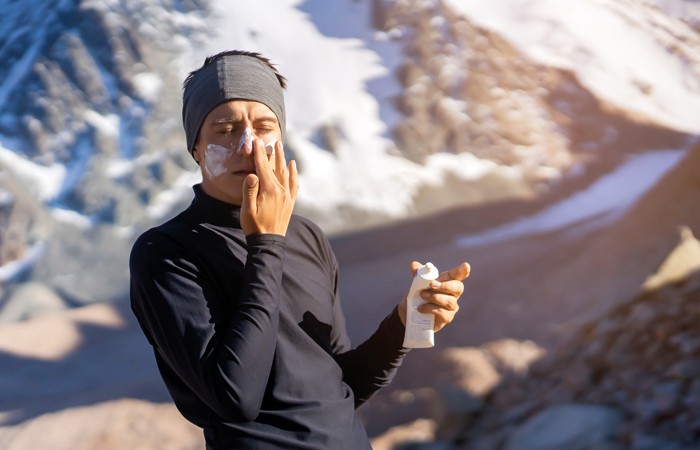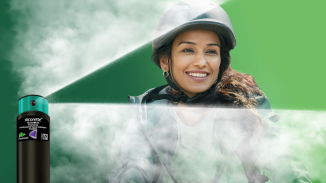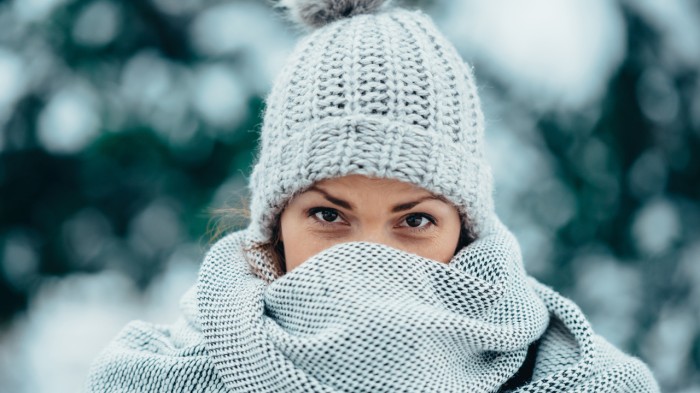In OTC Category Reviews
Follow month by month updates on topics including asthma, mental health and skin conditions and be able to provide informed advice to customers at the counter.Bookmark
We usually associate skin problems with the summer months, but the cold, wet British winter can play havoc with skin too.
The skin is the largest organ of the body and is made up of two main layers – the outer epidermis and the inner dermis. Cells in the deepest layer of the epidermis divide to make new cells that are pushed towards the surface to replace existing cells that wear off and flake away.
Healthy skin is covered in a thin layer of fatty lipids that lock in moisture and keep skin smooth and supple, but winter’s colder temperatures and low humidity mean the air across the UK becomes dry and makes some skin conditions worse. Additionally, lifestyle choices and washing habits also remove these fatty oils, leaving skin unprotected and exacerbating skin complaints.
Common skin conditions
Dry skin is extremely common and can appear all over the body, but is most predominant on the face, hands, arms and legs. Characterised by intense dryness, fragility, tightness, and even cracking and bleeding, dry skin can be made worse in winter thanks to wind, extreme cold and excessive heating – and switching between cold outside and warm inside environments.
Keeping the skin well moisturised with simple, skin-type-appropriate products is the best place to start tackling dry skin, but there are plenty of lifestyle changes that pharmacy teams can also advise customers to try to beat the ‘winter itch’.
For example, it’s a good idea to stay away from harsh skin cleansing products containing alcohol and choose mild, non-soap cleansers. During this cost-of-living crisis many people have already turned down their thermostat a few degrees out of necessity, but cooler rooms prevent the dry heat that dries out skin and using a humidifier will add moisture to the air.
Wrapping up in warm layers to go outside will also protect skin from exposure to sudden temperature fluctuations. And of course, a healthy, balanced diet; low in alcohol and processed food promotes healthy skin, with customers who struggle to eat well potentially benefitting from supplementation.
Rosacea presents as facial redness and is a common long-term skin condition that can be worse in winter – affecting one in 10 people in the UK, mainly aged 40-60, and more common in women and people with lighter skin. It’s not known what causes rosacea, but common triggers include alcohol, spicy foods, cheese, caffeine, hot drinks and aerobic exercise like running.
Although rosacea cannot be cured there are treatments that can help, and pharmacy teams should encourage customers to see their GP as NHS advice says rosacea is a condition that can get worse if it’s not addressed.
Treatments that can help include prescription creams and gels, a course of antibiotics, and intense pulsed light (IPL) treatment. GPs may then refer patients to a dermatologist if these do not work. In the meantime, customers can be advised that heat and cold can make rosacea worse, so they should try to cover their face in cold weather.
It’s not just our faces that are at risk from winter blasts. The colder weather poses its problems when it comes to skin conditions that affect the body as well.
“Psoriasis, eczema or seborrhoeic dermatitis tend to deteriorate in the winter,” says Dr Adil Sheraz, consultant dermatologist and British Skin Foundation spokesperson. “Most of these conditions tend to get better in the sun, which is why you may notice your skin flaring in winter.”
Seborrhoeic dermatitis is the most common of the three and results in a flaky rash, sometimes with greasy feeling flakes around the nose, forehead and scalp. It is caused by a yeast that lives on the skin which can overgrow and encourage a rash to develop.
Eczema is another common skin condition, affecting one in five children and one in 12 adults, according to the National Eczema Society, while psoriasis affects some 1.8 million in the UK, with the number of diagnosed cases increasing.
The cause of psoriasis is still a mystery, although it is now established as a multi-system disease affecting skin and joints and associated with inflammation through the body, especially the cardiovascular system. The normal process of skin turnover of three to four weeks happens over three to seven days for people with psoriasis, so immature thick skin is pushed to the surface, causing thick plaques.
There are many treatments available for both eczema and psoriasis, but their efficacy varies from person to person. Emollients help with psoriasis as they help soften hard skin plaques, remove scales and prevent itching, although customers struggling with these if their condition is extensive should be referred to their GP as there are other treatments that can help moderate to severe psoriasis. Emollients are also used to tackle atopic eczema, along with topical corticosteroid creams and ointments to reduce swelling and redness during flare-ups.
As well as advice about a balanced diet, Dr Sheraz’s top tips for looking after body skin in winter are:
- Moisturise: The skin on certain parts of your body is thinner and therefore will lose more fluid. Areas such as lips, knees, elbows will often look dryer. Most of this ‘drying out’ will occur at night so moisturise not only during the day but before sleeping. You can also improve the skin’s barrier function by applying regular emollients that contain ceramides and vitamin B
- Hydrate: We tend to drink less water in the winter and will often resort to hot caffeinated drinks which act as diuretics resulting in more fluid loss. Dehydration will give a lacklustre and dull appearance to the skin so drink plenty of water and not just coffee or alcohol
- Exfoliate: A weekly gentle exfoliation will clear the stratum corneum – the top few layers of skin which is mostly comprised of dead cells. Clearing this layer will allow for better penetration of moisturisers
- Sunblock: A sunblock should ideally be used all year around to protect against developing wrinkles and importantly reduce skin cancer risk (see below for more on winter sun care).
Feet can also bear the brunt of switching between hot and cold temperatures in winter. Chilblains are small, itchy swellings on extremities such as fingers and toes that occur when blood vessels near the surface of the skin contract in reaction to cold and then expand too quickly when exposed to heat.
Although it’s tempting to warm up cold feet in hot water, on a radiator or with a hot water bottle, customers can avoid chilblains by instead soaking their feet in warm water to allow them to gradually return to their normal temperature.
Most chilblains get better on their own after a few weeks, but people who are prone to them can help keep them at bay by staying warm and active, and giving up smoking, as having good circulation can help prevent chilblains.
Winter can be a challenging time for people with skin conditions, so being able to help customers with good advice, helpful support and signposting will go a long way to help them feel comfortable and stay healthy.
Fun in the (winter) sun
In the UK we tend to think about sun protection in the spring and summer months since the sun’s UV radiation is stronger during these times of year. However, while this is true of UVB (which causes sunburn) it’s UVA (which causes skin ageing) that we need to be mindful of during winter, since up to 95 per cent of UV radiation that reaches the earth’s surface is UVA and remains pretty consistent all year round.
“Sun safety is really important as sunburn can happen at any time of the year,” says Dr Hilary Jones, TV medic and advisor to Japanese skincare range Hada Labo. “What’s more, skin cancer is very much on the increase, and we are not safe just because we are in the UK. There are 16,744 new cases of melanoma skin cancer in the UK every year and 2,333 deaths, with melanoma the fifth most common cancer in the UK. Yet 86 per cent of these deaths could be prevented, as studies show most of us don’t apply sufficient sun screen or apply it often enough or early enough before exposure to the sun.”
This means pharmacy teams are well placed to advise customers how to reduce their risk of skin cancer by raising awareness of the importance of all-year-round sun protection – with the following top tips from Kathryn Clifford, co-founder of skin cancer education charity Skcin:
- Cover up with clothing. This is our first line of defence against UV radiation. This is much easier in the winter months. However, our scalp, face, neck and hands are often still exposed and are common places for skin cancer to develop so wearing a hat and gloves will provide further protection
- Apply sunscreen to all exposed skin. Skcin recommends a minimum SPF 30 with UVA protection (ideally rated four or five stars). Apply sunscreen 20 minutes before venturing outside and reapply every two hours if spending prolonged periods of time outdoors
- Wear good quality sunglasses. Our eyes are up to 10 times more sensitive to UV damage than our skin, so wearing sunglasses on bright days all year round will not only protect eyes, but the delicate skin around them
- Take extra care if you’re a winter sports enthusiast. UV rays can be just as damaging on the ski slopes as they are on a hot, sunny beach because UV radiation increases by approximately 10 per cent with every 1,000m in altitude and snow reflects up to 80 per cent of UV, thereby significantly increasing its intensity
- Check your skin. From top to toe, once a month for signs of any new, unusual or changing spots, moles, freckles or marks and to seek immediate professional advice from their GP or a dermatologist with any concerns. The sooner skin cancer is diagnosed and treated the better - early detection saves lives
- Signpost customers to further information that will help them take charge of their skin health and surveillance such as by installing the Skcin app on their mobile device. See boxout below to find out more.

Sponsored
 Sponsored education
Sponsored education
Helping vapers find a path to quit
Help vapers find a path to a nicotine-free life when they are ready to quit with the first NRT product licensed for this indication
 Sponsored education
Sponsored education
A different approach to pain
Complete this interactive video to rethink your pain recommendations and ensure you offer every customer the most appropriate advice


Record my learning outcomes